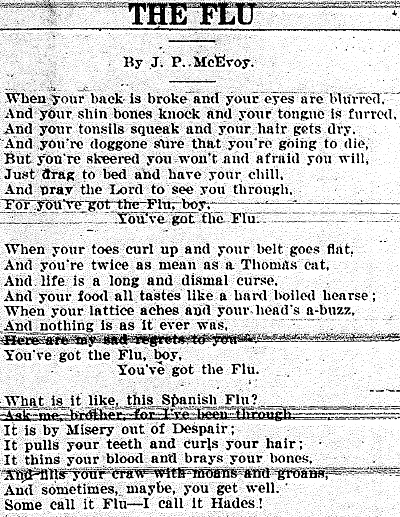That the newspaper reporting was even more confused than usual may reflect the general disruption wrought by the disease. Case in point: the town's two newspapers could not agree on whether the schools were closed on December 2 by Dr. Clara Faulkner as the town's health officer, or on December 3 by Dr. Richard Mackey as school board president; nor could they settle on whether it was one-fifth of the students and teachers who were out sick, or a fourth of the teachers and fully half of the students.
They could agree only that the schools were closed, and that conditions were bad.
On December 4 Dr. Faulkner, alarmed by the 38 new cases reported in the previous two days, once again took the drastic step of placing the town under quarantine for the rest of December. According to the Gazette, her orders forbade church meetings, public funerals, all public meetings of any character, including militia drills, and the operation of theaters, pool rooms, soda and ice cream parlors; indeed, she even asked that people not hold private parties in their homes. (The account in the News differed only in stating that ice-cream and soft-drink parlors, pool rooms and drug stores were placed on restricted hours rather than closed altogether.)
The next week's papers — crammed again with news of the flu's malicious business in town and countryside — also carried evidence that apparently the local churches were either pressuring Dr. Faulkner to lift the restrictions on them, or proceeding with their activities in spite of the quarantine. Dr. Faulkner's irritation with them came through clearly in her public statement, printed in both newspapers:
Although there is no desire on my part to lessen the ban in this vicinity on account of the influenza, that is still raging with practically the same severity as in the past, I will say that if the ministers and various church organizations of Hobart wish to contribute to the spread of the epidemic, and assume full responsibility therefore, morning services may be conducted for people of adult years, and I will presume not to interfere, but it shall be explicitly understood that there shall be permitted only such Sunday morning service.The rest of her statement was a repetition of the usual advice: avoid crowds, don't go out if you have the flu, don't visit homes where people have the flu. (Sometimes those visits were missions of mercy: this week's flu patients included Mrs. Robert Scholler, who fell ill after nursing Mr. and Mrs. Frank Reissig through their bout of the flu.)
On the same page as Dr. Faulkner's statement, the News reprinted a poem by Joseph Patrick McEvoy, which tried to find some wry humor in the misery:

Sources:
♦ "Influenza Still Rages." Hobart Gazette 13 Dec. 1918.
♦ "Local Drifts." Hobart Gazette 6 Dec. 1918; 13 Dec. 1918.
♦ McEvoy, J.P. "The Flu." Poem reprinted in Hobart News 12 Dec. 1918.
♦ "Notice to the Public." Hobart Gazette 13 Dec. 1918.
♦ "Notice to the Public." Hobart News 12 Dec. 1918.
♦ "Quarantine on Tight." Hobart Gazette 6 Dec. 1918.
♦ "Schools Closed Until Jan. 1 on Account Influenza Epidemic." Hobart News 5 Dec. 1918.
♦ "South of Deepriver." Hobart News 12 Dec. 1918.


No comments:
Post a Comment